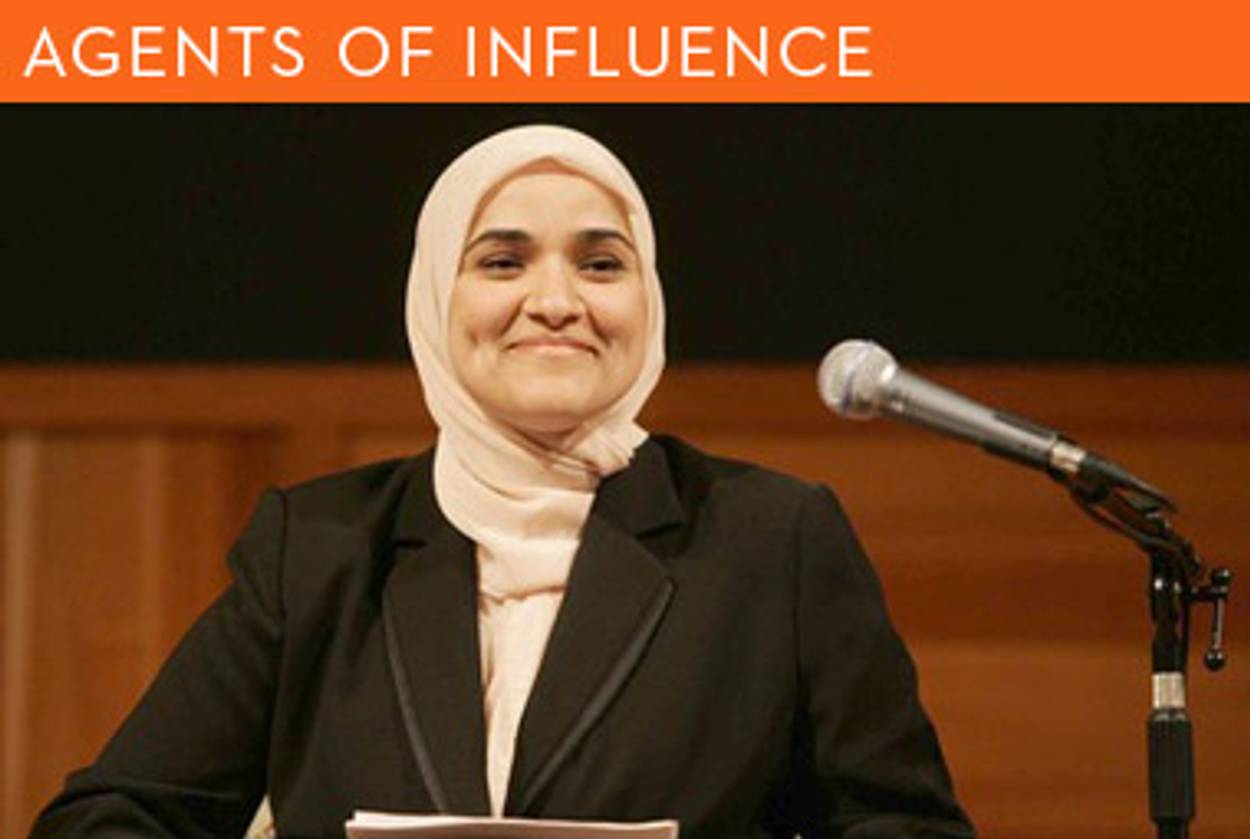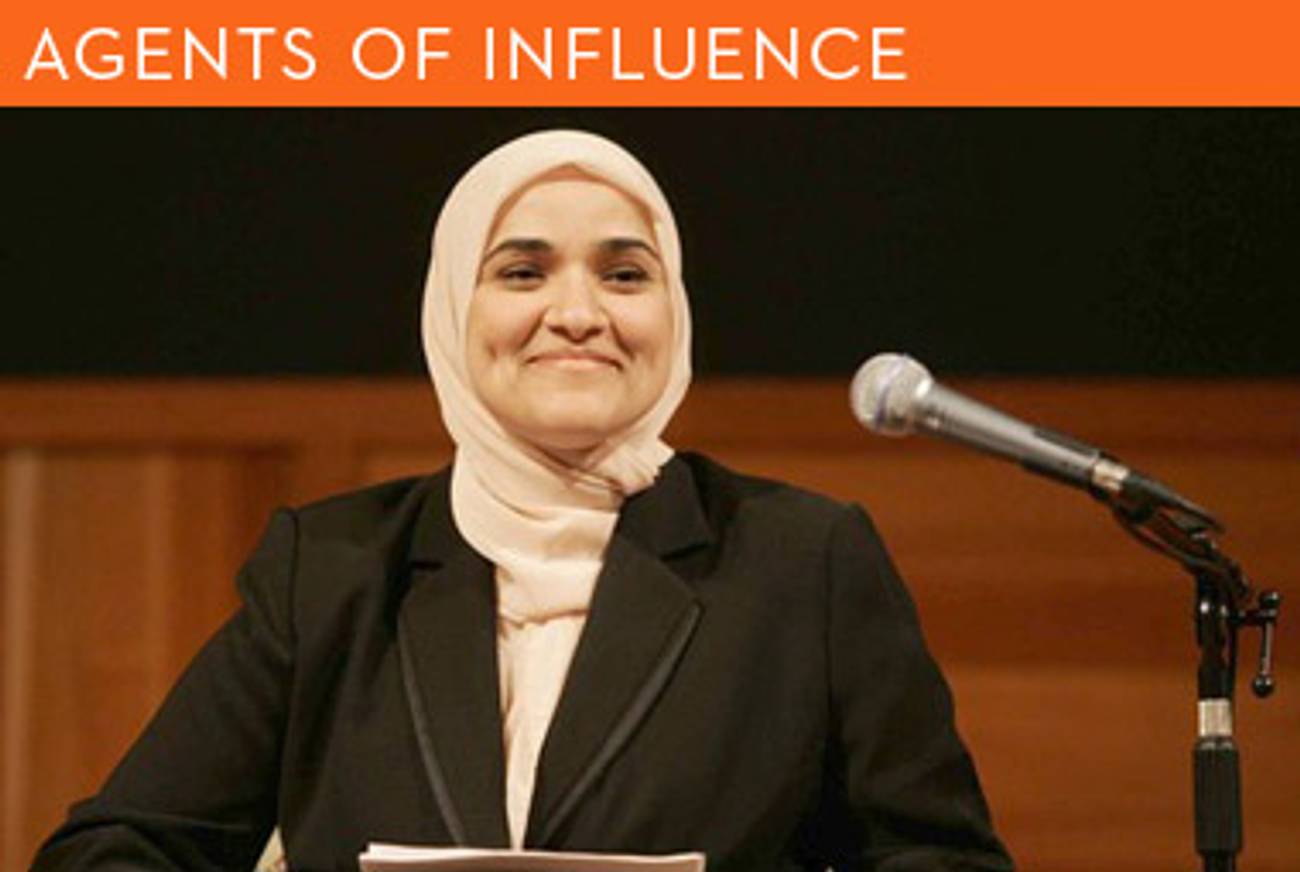Respectfully Yours
Dalia Mogahed may be the most influential figure guiding the Obama Administration’s Middle East outreach




The most important person shaping the Obama Administration’s Middle East message isn’t Hillary Clinton, Robert Gates, Dennis Ross, Joe Biden, or Rahm Emanuel. Rather, it’s a Cairo-born mother of two named Dalia Mogahed.
“I had a lot of input on framing different issues for the President’s Cairo speech,” Mogahed, a 34-year-old chemical engineer-turned-pollster for the Gallup Organization, told me recently. Mogahed, who holds a BS from the University of Wisconsin and an MBA from Pittsburgh, was appointed by the president last year to sit on the Advisory Council of Faith-Based and Neighborhood Partnerships, which drafted a memo to the president’s speechwriters that helped to shape the president’s famous address to the Muslim world. Of course, there are plenty of people who are credited with writing the Cairo speech, or who claim credit for it, but Mogahed alone has regular access to the White House, through its Senior Director for Global Engagement, Pradeep Ramamurthy, and through Joshua DuBois at the office of Faith Based and Neighborhood Partnerships.
As founder and executive director of Gallup Center for Muslim Studies, Mogahed regularly travels the Middle East and other Muslim regions to find out what people are really thinking. What she’s discovered is that America doesn’t need to sell itself to Muslims. “In our research,” says Mogahed, “we found that was not the right approach. People largely know what we stand for. They tell us they admire what we say we admire about ourselves. The issue is that they don’t believe we admire anything about them. Our policies are seen through a prism of perceived disrespect.”
Mogahed has encouraged the White House to “demonstrate an appreciation for Islam’s contributions to the world, rather than simply reassuring Muslims that we believe Islam is peaceful.” The point that America needs to make, she says, is that we believe Islam “is not just benign but beneficial.” Speaking to the Muslim world as a great undifferentiated throng slights the specific historical and practical circumstances of individual countries but suits Obama’s self-image as a transformative leader, one who calls on different parts of the globe according to how they structure their fears and hopes and premonitions of the eternal. Obama is the Great Listener who hears the world’s laments and seeks to redress the indignities visited upon those who are unhappy with the current order.
Obama, it is worth remembering, is the child of a father who left his native land to come to America in search of a better life—but did not find it. Mogahed, on the other hand, is the product of a successful immigrant story. Her Egyptian parents uprooted her, at the age of 5, and her sisters to move to Madison, Wisconsin, for graduate degrees in engineering. “I was raised in a home that valued faith,” says Mogahed. “But education was the biggest thing. My sisters and I were encouraged to excel in education. It was the typical immigrant story,” she says. “They spoke Arabic to us, and we answered them in English.”
It wasn’t until college at Wisconsin that Mogahed became fluent in Arabic, a skill that would become invaluable when her bosses at Gallup accepted her proposal to create a special unit researching Muslim societies. Her Muslim West Facts project, Mogahed explains, disseminates research on Muslim as well as Western societies. “The idea,” she says, “is in briefings with policymakers and opinion leaders to inform the conversation with the voices of ordinary people.”
Mogahed’s research sparked some controversy with the publication of a book she co-authored with John L. Esposito, founding director of Georgetown University’s Prince Alwaleed Bin-Talal Center for Muslim-Christian Understanding. The 2009 book Who Speaks for Islam? is based on a six-year Gallup project interviewing tens of thousands of Muslims from more than 35 countries, constituting a polling sample that represents “more than 90 percent of the world’s 1.3 billion Muslims.” Using the respondent’s feelings about 9/11 as the standard to define gradations swinging from moderation to extremism (a 1-5 scale from “not at all justified” to “completely justified”), the book set out to prove that the vast majority of the world’s Muslims are moderate by nature. Yet it was hard for many readers to be comforted by the news that only 7 percent of the respondents answered that 9/11 was completely justified. Not only would a pool of 91 million people be more than sufficient to create a climate of violent extremism, but it also appears that Mogahed and Esposito fudged their definition of moderation: As Mogahed admitted in a panel at the Washington Institute for Near East Policy, an additional 6.5 percent of her sample believed the 9/11 attacks were “partially justified.”
Some in Washington see Mogahed and Esposito as whitewashing the problem posed by the growing power and influence of radical Islamists and view it as part of a larger context of the Obama Administration’s public diplomacy efforts. “There’s nothing wrong with outreach to Muslims,” says WINEP’s Executive Director Robert Satloff. “Executed intelligently, such outreach may be quite useful. The problem is that the same eagerness for outreach has not been matched by an eagerness to counter Islamic extremism. Outreach and counter-radicalization are not the same thing, and we have not seen this Administration meet this latter challenge with the same vigor.”
Concerns that Mogahed could not distinguish between moderates and radicals intensified after she gave a call-in interview to a British TV show hosted by a member of Hizb ut-Tahrir, an organization condemned by the U.S. State Department for its anti-Semitic, anti-Western ideology and for promoting jihad against U.S. troops in Iraq and Afghanistan. “I didn’t know the affiliation of the host when I accepted the invitation,” says Mogahed. “I went on to convey research findings, and the fact the research was used to make points that Hizb ut-Tahrir supports is not something I advocate.”
Mogahed’s mistake underscored the fact that she is not a policy professional whose activities are subject to the kind of vetting process that is standard fare in bureaucratic Washington. But Mogahed’s mistake was simply a mistake: In conversation, she comes across as a somewhat innocent, guileless person, a surprising quality for someone who advises the Administration on an issue fraught with controversy. “I am not a pundit but a researcher,” she says. “I don’t engage people in ideological debate.”
Nonetheless, Mogahed will find herself in the middle of white-hot ideological arena in New York City tomorrow, when she will be part of a PEN American Center panel marking the first U.S. public appearance of Tariq Ramadan, the European Muslim activist whose visa application to the U.S. was famously rejected by the Bush Administration. Mogahed says she has met Ramadan at events in the past but chooses not to comment when I ask her opinion on his notorious debate with France’s former Interior Minister, now President, Nicolas Sarkozy, who challenged Ramadan to condemn the stoning of women for adultery (Ramadan agreed only to a “moratorium” to allow for proper discussion of the practice). Mogahed says it’s important to listen to Ramadan, because he’s an “important voice that carries influence, especially on the subject of integrating Muslim and European identity.”
Why, I asked Mogahed, did President Obama defend a woman’s right to wear the veil during the Cairo speech? Was he criticizing France for its ban on the headscarf? “I think what he meant is to take a celebrated principle of American society, religious freedom, and highlight it. Just because France is a close ally doesn’t mean we won’t call them out when we see a policy as unjust.”
And yet according to Mogahed’s research, accentuating our differences with our ally matters little since France still rates considerably higher than the U.S. in Muslim opinion. “We are strong compared to Europe in our domestic policies,” says Mogahed, “but this is overshadowed by the perception that our foreign policy is hostile toward Muslims.” The main issues, says Mogahed, are the U.S. wars in Iraq and Afghanistan as well as our position in the Palestinian-Israeli conflict. These acute issues, she says, constitute one of the three main sources for the tension between the United States and the Muslim world. The other two, she says, are “political domination, or the perception that we control and dominate Muslims as a post-colonial imperial power; and the concept of disrespect.” In other words, says Mogahed, “the tensions are not about what they think of our values, but about what they think we think of theirs.”
And yet there is no escaping the unhappy fact that while Americans may well come to admire some folkloric aspects of the Muslim world, it is clear we do not hold in high regard the limited opportunities and resources that the Muslim world affords its people: Otherwise, large numbers of us would be looking to move to Egypt, Saudi Arabia, and Pakistan. Mogahed’s research itself eloquently testifies to the sad condition of the Muslim world. What Muslims want most for their own regions, says Mogahed, is unity. Instead, there’s widespread discrimination against ethnic and confessional minorities and Muslim sects and civil war throughout the region. To name just a few examples, there’s Sunni and Shia fighting in Iraq and Lebanon, Hamas and Fatah at war in the Palestinian territories, and the Islamic Republic of Iran squared off against the Sunni Arab states for regional domination. Meager standards of living combined with a violent political culture and a paucity of intellectual achievement and technological innovation ensure that none of these disputes are likely to end any time soon. Not even the President of the United States can alter these facts.
“Respect” may be the Obama Administration’s keyword for dealing with the Muslim world, but one might argue that there is nothing respectful about lying through our teeth to a substantial part of humanity and pretending to admire culturally ingrained behavior and practices that we in fact deplore. Nor is there anything kind and decent about imagining that Muslims are so childish as to be duped by our mendacity. Muslims in the Middle East are well aware of the tragedy of their situation as members of a society in which innovation, education, and personal liberties are on the decline and violent radicalism is on the rise. That is the reason for their anger and despair.
Lee Smith is the author of The Consequences of Syria.
Lee Smith is the author of The Permanent Coup: How Enemies Foreign and Domestic Targeted the American President (2020).